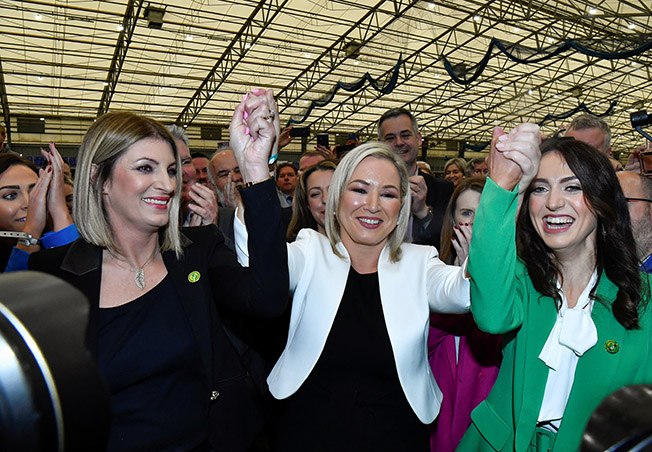289
 |
| Sinn Fein deputy leader Michelle O’Neill (centre) reacts as she is elected during the Northern Ireland Assembly Elections at the Meadowbank Sports Arena, in Magherafelt |
Sinn Fein, the former political wing of the IRA, looked set to claim top spot in elections in British-controlled Northern Ireland for the first time, a historic shift that could bring the once-remote prospect of a united Ireland closer.
Sinn Fein secured 29% of the first-preference vote compared with 21.3% by the pro-British Democratic Unionist Party (DUP), indicating it was likely to become the first Irish nationalist party to win the most seats in an election to the regional assembly since the state’s creation in 1921.
“Sinn Fein on course to hold the first minister job is an earthquake” for Northern Ireland politics, said Bill White, chief executive of polling company LucidTalk. “This is seismic.”
A Sinn Fein victory would not change the region’s status, as the referendum required to leave the United Kingdom is at the discretion of the British government and likely years away.
But the psychological implications of an Irish nationalist first minister would be huge after a century of domination by pro-British parties, supported predominantly by the region’s Protestant population.
Demographic trends have long indicated that they would eventually be eclipsed by predominantly Catholic Irish nationalist parties who favour uniting the north with the Republic of Ireland.
SINN FEIN REINVENTED
Once shunned by the political establishment on both sides of the border for its links to paramilitary violence, Sinn Fein is already the most popular party in the Republic of Ireland, where it has carved out a successful base three years out from national electionsby campaigning on everyday issues such as the cost of living and healthcare.
It followed a similar path in the Northern Irish elections, where it focused on economic concerns rather than Irish unity to appeal to middle-ground voters.
Northern Ireland’s complex proportional representation voting system means the party with the most first-preference votes does not necessarily win most seats but a number of analysts said Sinn Fein’s lead was too big to catch.
Final results are not expected until Saturday.
The cross-community Alliance Party also appeared set for its strongest ever result, the first timea non-nationalist or unionist party came in third place.
Committed to peaceful coexistence and political power-sharing in Northern Ireland since the Good Friday peace accord in 1998, which ended three decades of violence, Sinn Fein wants planning for a border poll to begin across the island.
“I believe Irish reunification and a new Ireland is the best opportunity for everybody who lives on this island and we need to talk about that,” Sinn Fein President Mary Lou McDonaldtold the BBC.
The main nationalist and unionist rivals are obliged to share power under the terms of the 1998 peace deal. But the DUP has said it will no longer do so unless the protocol governing Northern Ireland’s trade with the rest of the UK following its exit from the European Union is totally overhauled.
“Until we get that progress, I made clear I will not be nominating ministers to the executive,” DUP leader Jeffrey Donaldson told Ireland’s RTE television.
That raises the prospect of a stalemate with no new government being elected as Britain and the EU are at an impasse in talks on how to remove many of the checks on goods entering Northern Ireland from the rest of the UK.
The election is likely to reaffirm that a majority of lawmakers in the regional assembly favour retaining the protocol, which was designed in the wake of Brexit to avoid fraying the EU single market via the open border with Ireland.
REUTERS

